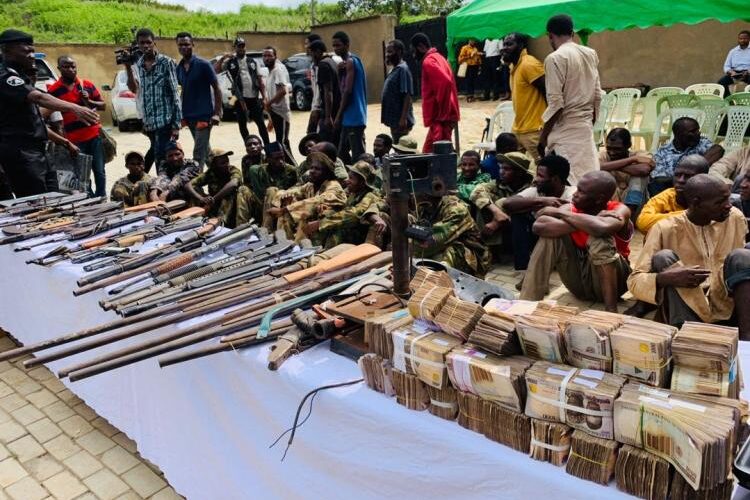4 min read
Our Take: The growing number of insecurity-related news and reports from across the country is becoming frightening. Terrorism, herdsmen attack, banditry/kidnapping, secessionist movement, militancy, armed robbery, and oil pipeline vandalism to name a few, are all the myriad of security threats facing the country. The most recent and current pattern of security threats; banditry and kidnapping for ransom have fuelled fear and doubt about Nigerian security personnel’s capacity to safeguard the live and properties of Nigerians. This calls for an urgent revival of the Nigerian security system to meet the security needs of its citizens.
Lately, flipping through the pages of newspapers and logging in to social media can be a harrowing experience. Screaming headlines such as “Bandits attack and ransack community”, “Students kidnapped by unknown gunmen”, “Scores killed, villages burnt” has sadly become a regular feature. It is not unsurprising that countries like Canada, Australia, the US and UK have issued travel warning on the country’s state of insecurity.
The sheer number of insecurity related news and reportage across the country is indeed worrisome. The country is undoubtedly facing a plethora of security challenges ranging from violent extremism, to farmer-herder conflict, banditry, secessionist movement, militancy, kidnapping for ransom, armed robbery and attacks on oil infrastructure, among others. Stating it as it is, from the North to the South, East to the West, life has become ‘nasty, brutish, and short’ for many.
April 27th could almost be classified as the climax. Infamously dubbed “black Monday”, what began like the usual stories breaking in the early hours of the day turned into tears, anguish and hopelessness by twilight, as bandits, kidnappers, arsonists and armed robbers reportedly had a field day unleashing mayhem across the country’s six geo-political zones. From Niger, Kebbi, Yobe, Borno, Abuja, Benue to Lagos, Anambra and Imo states, the stories were tales of mayhem, arson, robbery, abductions and deaths.
April also witnessed the abduction of students of the Greenfield University in Kaduna, and the gruesome murder of five of the abducted students by their captors so far. Seeing pictures on social media of one of the abducted student’s funeral service amid tears and sorrow cast a shadow over the nation’ insecurity challenge and underscores the urgent need for the revitalization of the nation’s security architecture.
From the chain of events, it is apparent that no one or region is safe or immune. The attack by bandits on the convoy of the Emir of Birnin Gwari in March, the attack by gunmen on police stations in Anambra and Imo states last month and killing about five policemen, Boko Haram hoisting its flag in Niger state which led to a primary school being hurriedly turned to an IDP camp, scores of abductions and successive attacks on our troops in the Northeast are just a few examples that shows that we all should be wary.
While the insecurity challenge is spread across the country, the North is where banditry, abductions and insurgency seem to be more rife. Many of the state governors across the region have been known to bemoan the dire situation. Babagana Zulum of Borno state has been vociferous against insurgency in the Northeast. Recently also, the Niger State governor Abubakar Bello raised the alarm of Boko Haram’s flag in some communities in the state.
However, what seems to be conspicuously absent in the region is perhaps a regional security outfit like what is being done by their counterparts in the Southeast with “Ebubeagu” and “Amotekun” in the Southwest meant to supplement the efforts of security personnel in battling the rising insecurity in the region. Why the North hasn’t replicated such is confusing. Early last year though “Shege-Ka-Fasa”, a security outfit was launched by a coalition of northern groups. However, not much has been heard of them towards stemming insecurity in the region.
Notwithstanding, one is still bound to have reservations about these security outfits out of concern that they might be exploited, especially by politicians in the long run. While they might come in handy and capable of alleviating the situation on ground in the short term, they might just be hijacked by unscrupulous influential fellows that are abound in our clime. Giving such people arms and ammunitions might just prove detrimental to the people they ought to be protecting. With agitations for secession in some quarters, these outfits might just be used to achieve other nefarious objectives.
Take the Special Anti-Robbery Squad (SARS) for example; they were formed to tackle the increasing spate of armed robberies. However, they morphed into something antithetical, becoming judge, jury and executioners in many cases and harassing many innocent youths that led to the #EndSars protest last year and ultimately, its disbandment. Also, several accounts of victims at the special tribunals set-up across the country revealed the extent to which SARS deviated from their objective.
While expectations have been high with the appointments of the new security chiefs, they need to quickly get the ball rolling. One believes Nigeria can surmount the current insecurity challenge when it takes into account the diverse nature of the security threats facing the country and adapt innovative solutions to each context. This, of course, will entail a holistic understanding of the local dynamics of each threat and integrating them into a multidimensional security approach/strategy.
For instance, the Northeast is plagued by insurgency, revived Biafran secessionist activities have escalated in recent years in the Southeast, leading to violent clashes between the country’s security forces and militia groups, clashes between farmers and herders over land have spurred the formation of ethnic militias, vigilante raids, and extrajudicial killings in the Northwest/Middle Belt. Understanding these dynamics is vital towards formulating a holistic multidimensional strategy to contain the threat they pose.
Intelligence gathering is also crucial in curbing the firebox of insecurity the country is currently enmeshed in. Active citizen engagement and citizen cooperation may be the most essential element of a successful response in each context. However, security force violence against citizens may prove to be a stumbling block. Remedying this and building trust with citizens ought to be a top and ongoing priority of any national security strategy.
The welfare and provision of adequate equipment for our security personnel particularly those in the frontline are also paramount. There have been stories of lack of incentive and firepower by our troops in the theatre of war. This needs to be addressed. Adoption of technology such as the use of drones and CCTV cameras like in other climes will serve as deterrent and can help effectively reduce crime and criminality.
The thirst for blood and the preference for violence in expressing pent-up frustration and disenchantment with the state may be a pointer to the need to revive moral values and virtues within the socioeconomic, political, religious and educational institutions in the country. Nigerian leaders, elites, politicians and supporters must be forced to evince and uphold moral values and virtues in all their conduct in order to lead by example and to avoid heating up the polity unnecessarily by their conducts and comments which sometimes incite violence in their followers.
Recommendation(s):
• To address these security challenges, the welfare of security personnel should be re-evaluated, adequate provision of security gadgets, particularly those on the front lines, is also critical.
• There is a need for the adoption of cutting-edge technology, such as the use of drones and CCTV cameras. These will serve as a deterrent and can assist effectively reduce crime and criminality, as obtainable in other climes.
• Intelligence gathering is also critical in putting a stop to the country’s state of insecurity. Active engagement and collaboration with the public will play a crucial role in assisting security experts in identifying and apprehending criminals.
About the Author: Hannatu Musawa is a qualified Barrister and Solicitor of the Supreme Court of Nigeria. She has had a varied and rich working experience both in Nigeria and in the UK. She is a Principal Partner at Laurus Lex, Legal Practice, London, United Kingdom. She is a human rights and women’s rights activist.
Source: Leadership
Keywords: Security, Insecurity, Nigeria, Banditry, Kidnapping, Militancy, Herdsmen













